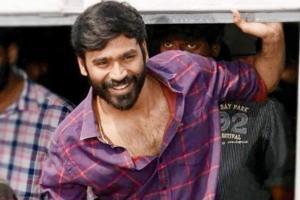Impossible to pick only one from Bollywood, heading to Chennai, for now

Going deeper into blowing the lid off the urban armpit, Vada Chennai patiently details the life among all outlaws in a single space-the jail
 Right at the first scene of Vetrimaaran's Vada Chennai, the goons mention how Jayalalitha will come to power in Tami Nadu next. This means the lot in the room can rule for the following 25 years!
Right at the first scene of Vetrimaaran's Vada Chennai, the goons mention how Jayalalitha will come to power in Tami Nadu next. This means the lot in the room can rule for the following 25 years!
ADVERTISEMENT
This immediately sets the unambiguous tone for the mob-violence masterpiece, set in north Chennai, in the political landscape post the death of the patriarch MG Ramachandran, with power thereafter essentially alternating between K Karunanidhi's DMK, and Jaya's AIADMK in Tamil Nadu. Either way it's impossible to remain on the foul side of the law, without adequate political patronage to get away with it.
The only dreaded don I've ever hung out with, in Uttar Pradesh, had similarly quit Mulayam Singh Yadav's SP to join Mayawati's BSP, with his friends equally split between both sides of the divide. That's the only way he could survive. Is UP, often synonymous with crime—both onscreen, and off it—similar to TN, as a fertile soil for mayhem and mass killings?
Doesn't seem like it. But Chennai, through Vetrimaaran's shockingly close lens, comes across as any other Third World metropolis, with a vast underbelly, where the country's young, uneducated urban poor, holding sickles and swords, predominantly reside, revolt, and on occasion, romance.
Speaking of which, while showing how the slum-hero falls in love with the girl in the adjacent neighbourhood, Vada Chennai most strikingly uncovers the dark logic of the Indian street, where if a single woman is found snogging a man, and therefore deemed immoral/loose, she's common property fit to be passed around among other men in that space. How/where did this girl and the boy meet?
In that moment of extreme lawlessness, and complete lapse of reason that we've only seen for years in news reports, but never quite ventured deeper to find out what it is like, when an anonymous mob turns riotous, and begins to openly ransack shops and establishments, knowing that no one can control them during a short time-window—before a semblance of order is finally restored.
The girl is trying to get away robbing a sewing machine. The boy tries to stop her. It's scenes like these that give you an insight into so-called real India, where the state is altogether an amorphous entity, and the law is in the eyes of the beholder. But the street, or the slum, isn't quite where Vada Chennai is entirely or even predominantly set.
Going deeper into blowing the lid off the urban armpit, the film patiently details the life among all outlaws in a single space—the jail—that, frankly, I haven't seen as effectively recreated, since Frank Darobont's Shawshank Redemption (1994), perhaps; or Shriram Raghavan's Ek Hasina Thi (2004), closer home. I'm willing to bet a jail, regardless of where in the Third World it is, follows a common constitution. Don't know if you've ever been to one.
I have, once (for sight-seeing; honestly). There's something about the air you breathe, the folk you're surrounded by, and the easily noticeable hierarchies within—you can instantly tell this is a shell so different from the world outside that you could almost get used to it. Inside a lock-up, I know that people are graded and therefore respected, or pushed around, on the basis of crimes that brought them in.
Rapists, for instance, fall at the lowest rung of this caste system. They're basically whacked the crap out of. If you've assaulted a cop, on the other hand, you're the dude. Full respect. The prison that Vada Chennai's protagonist walks into is split between the city's two rival gangs. He's caught in the crossfire.
The manner in which he nimbly navigates this space is what, as an audience, blows your mind first. Contrast this constricted space to the coastal slum under an open sky in the film, where you can literally smell the rotten fish, and the rogues who surround it. Dhanush plays the central character, almost merging into this background as an Everyman, with a sword hanging over his head—like everyone else, who may choose not to always mind their own business. The script cleverly plays with structure, like a mystery-thriller.
The grammar of the Mob-opera isn't new, of course. While the highly avoidable final 20 minutes—that descends into mainstream heroism, and long reveals/explanations—may seem more along the lines of Vishal Bharadwaj's path-breaking Maqbool (2003), is Vada Chennai, per se, the southern equivalent of Ram Gopal Varma's Satya (1998)? Only in the sense that Satya itself was essentially Martin Scorsese in Mumbai. Or that every sprawling metropolis deserves and perhaps has its own Satya.
Fernando Meirelles's City Of God (2002) is to Rio, what Takeshi Kitano's Sonatine (1993) is to Tokyo, or Matteo Garone's Gomorrah (2008) is to Naples. Yes, Vada Chennai (available on Hotstar) is very much in that league of extraordinary grime! Is it the most jolting Indian film I saw this year? Hell, yeah.
Mayank Shekhar attempts to make sense of mass culture. He tweets @mayankw14 Send your feedback to [email protected]
Catch up on all the latest Crime, National, International and Hatke news here. Also download the new mid-day Android and iOS apps to get latest updates
 Subscribe today by clicking the link and stay updated with the latest news!" Click here!
Subscribe today by clicking the link and stay updated with the latest news!" Click here!






